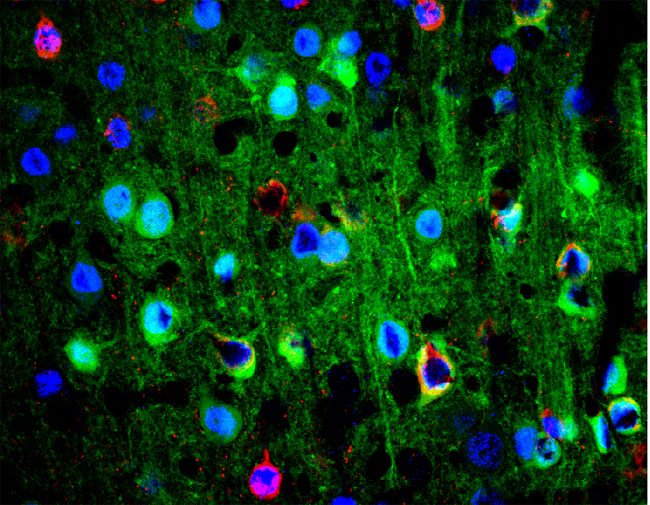 Friday 6 March 2015 2:25pm
Friday 6 March 2015 2:25pm
Illuminating the diversity of motor neuron types in the mouse brain with specific fluorescent markers.
A University of Otago researcher is part of an international collaboration that has developed an exciting and expansive new set of tools to probe cell types in the brain.
The scientists' work, reported this week in the leading journal Neuron, partly involves using techniques that manipulate the genes of a small subset of cells so that the cells glow under fluorescent microscopes. By manipulating unique gene markers for each cell type into fluorescent labels or probes, the structure and function of various types of neurons can be visualized and studied.
Another facet of these new tools, beyond making certain cell types fluorescently glow, is the ability to use light to make the cells actually fire a signal, using a technique called optogenetics.
The combination of fluorescent imaging and optogenetic stimulation is a powerful way to learn both where cells are in space, when they are active or silent, and how they interact, or connect, with other cells in the circuits they form.
Associate Professor Ruth Empson of Otago's Department of Physiology says these innovations are powerful new techniques that will greatly advance worldwide efforts to understand how different parts of the brain connect and communicate during behaviour.
“It has been amazing to be part of such an important international effort from New Zealand. These new tools are now assisting an exciting new Marsden-funded collaboration—with Professor Thomas Knopfel of Imperial College London and Dr Andrew Clarkson of Otago's Anatomy Department—that will help understand the significance of connectivity changes among a specific group of motor neurons after stroke,” Associate Professor Empson says.
The collaborations were led by Allen Institute for Brain Science scientists and included researchers at University College London, MIT, Imperial College London, University of Zurich, RIKEN Brain Science Institute, Mount Sinai Hospital and Associate Professor Empson's laboratory at Otago.
View a short YouTube video on the new tools.
For more information, contact:
Associate Professor Ruth Empson
Department of Physiology
University of Otago
Tel 64 3 479 7464
Email ruth.empson@otago.ac.nz
A list of Otago experts available for media comment is available elsewhere on this website.
Electronic addresses (including email accounts, instant messaging services, or telephone accounts) published on this page are for the sole purpose of contact with the individuals concerned, in their capacity as officers, employees or students of the University of Otago, or their respective organisation. Publication of any such electronic address is not to be taken as consent to receive unsolicited commercial electronic messages by the address holder.